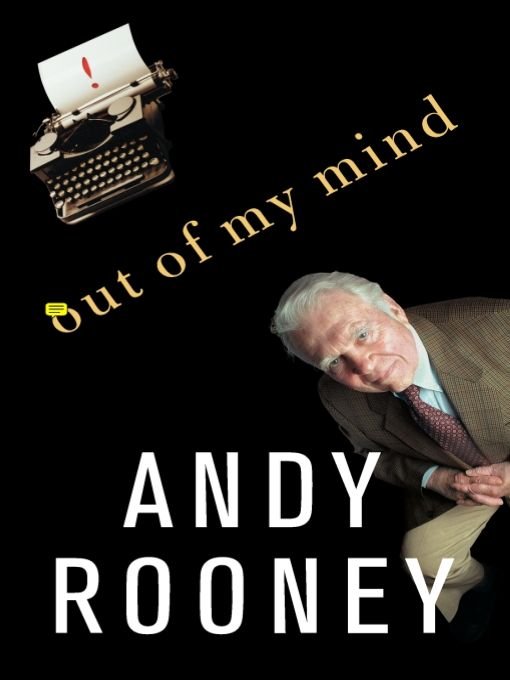Out of My Mind
Authors: Andy Rooney



Table of Contents
Â
Â
Â
Â
Â
Â
Â
Â
Â
Â
Â
Â
PREFACE
I thought to myself, lying in bed one night, in an uncharacteristic moment of modesty, “How much do I have to say that anyone cares about reading?”
If you write for a living, you have to put modesty out of your mind. It is a great privilege to have something you have written preserved in type and printed as a book.
One thing I know is, you can make an essay out of anything. There are times when I've written on subjects about which I know very little. A writer can do that. He has the advantage of being able to look things up, to ask questions of other people more knowledgeable than he. He can sit back and think before putting anything down on paper. This puts the writer one up on readers and often makes him sound smarter than he is. I try to do that. It doesn't seem dishonest. I comb my hair and try to wear decent clothes so I'll look better than I would naked, so why shouldn't I try to write in a style that makes me sound smarter and more interesting than I am?
This book is made up of all essays. The essay is a grand and classic writing format. Igor Stravinsky, the musician, tried to write at one point in his career. He said, “I experience a sort of terror if I sit down to work and find an infinity of possibilities open to me. No effort is conceivable.”
Stravinsky said he conquered that terror by turning his creative urge to the seven notes of the scale and writing music. “For then I have something solid and concrete,” he said. “I am saved from the anguish of unconditional liberty.”
I turn not to the piano, but to the essay form. The essay offers a writer a great deal of freedom but falls short of offering the “unconditional liberty”
that stopped Stravinsky. The essay provides a writer boundaries within which he can go to work. Confinement is conducive to creativity.
that stopped Stravinsky. The essay provides a writer boundaries within which he can go to work. Confinement is conducive to creativity.
I am not a great writer, but I don't write badly very often. This passes for good writing. As a matter of fact, there's just so much good writing anyone can take. To some extent, it's like acting. If you notice the acting, it probably isn't good. Good writing shouldn't call a lot of attention to itself, either.
Something happens to a lot of people when they write. Their voice changesâeven on paper. They tighten up and are not themselves. One thing of which I am certain is that no one writes as he speaks and no one speaks as he writes. When a writer is faced with the choice of styles, it is always better if he writes more like he speaks. If you know the writer, you should be able to hear his voice as you read the words.
You can't take the idea too far because when we talk we are hesitant, discursive and repetitive. If you make a verbatim transcript of a conversation, it invariably needs to be heavily edited before being printed.
The writer gets a good break in newspapers. His or her name is right there up front, available for credit or blame on whatever has been written. In the arts, it has always bothered me that the writer takes last place. The credits on a movie or a play almost always list the writer in small type where it's hard to find. I never knew why this was because actors are a dime a dozen and good writers are hard to find. The production of a play or a movie or the publication of a book stands still until the writer gets the words down on paper. No one can do anything until the manuscript appears. There are a dozen editors, publishers, directors, producers and investors waiting for one writer to get something down on paper. Then they change it.
Writing an essay is, for me, always a pleasure because people tend to leave it alone. An essay isn't important enough to change.
Other books
Vengeance: A Novel (Quirke) by Black, Benjamin
Unbreak My Heart by Lorelei James
Bomb by Steve Sheinkin
Cherry Creek by Dani Matthews
The Westminster Poisoner by Susanna Gregory
Degrees of Nakedness by Lisa Moore
The Fisherman by John Langan
The Cruise of the Snark by Jack London
Rudyard Kipling's Tales of Horror and Fantasy by Rudyard Kipling
Toygasms! by Sadie Allison